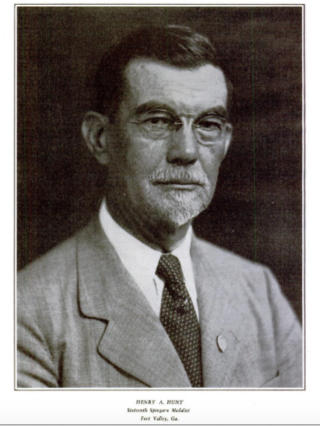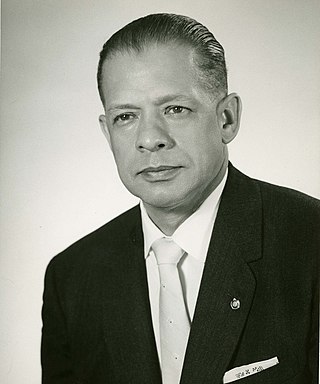Related Research Articles

UNCF, the United Negro College Fund, also known as the United Fund, is an American philanthropic organization that funds scholarships for black students and general scholarship funds for 37 private historically black colleges and universities. UNCF was incorporated on April 25, 1944, by Frederick D. Patterson, Mary McLeod Bethune, and others. UNCF is headquartered at 1805 7th Street, NW in Washington, D.C. In 2005, UNCF supported approximately 65,000 students at over 900 colleges and universities with approximately $113 million in grants and scholarships. About 60% of these students are the first in their families to attend college, and 62% have annual family incomes of less than $25,000. UNCF also administers over 450 named scholarships.
Historically black colleges and universities (HBCUs) are institutions of higher education in the United States that were established before the Civil Rights Act of 1964 with the intention of primarily serving African Americans. Most of these institutions were founded during the Reconstruction era and are concentrated in the Southern United States. During the period of racial segregation in the United States, the majority of American institutions of higher education served predominantly white students, and disqualified or limited black American enrollment. Later on some universities, either after expanding their inclusion of Black people and African Americans into their institutions or gaining the status of minority-serving institution, became Predominantly Black Institutions (PBIs).

William Herbert Gray III was an American politician and member of the Democratic Party who represented Pennsylvania's 2nd congressional district from 1979 to 1991. He also served as chairman of the House Committee on the Budget from 1985 to 1989 and House Majority Whip from 1989 to 1991. He resigned from Congress in September of that year to become president and chief executive officer of the United Negro College Fund, a position he held until 2004.

The Black Cabinet, or Federal Council of Negro Affairs or Black Brain Trust, was the informal term for a group of African Americans who served as public policy advisors to President Franklin D. Roosevelt and First Lady Eleanor Roosevelt in his terms in office from 1933 to 1945. Despite its name, it was not an official organization. The term was coined in 1936 by Mary McLeod Bethune and was occasionally used in the press. By mid-1935, there were 45 African Americans working in federal executive departments and New Deal agencies.

Mary Jane McLeod Bethune was an American educator, philanthropist, humanitarian, womanist, and civil rights activist. Bethune founded the National Council of Negro Women in 1935, established the organization's flagship journal Aframerican Women's Journal, and presided as president or leader for a myriad of African American women's organizations including the National Association for Colored Women and the National Youth Administration's Negro Division.
The civil rights movement (1896–1954) was a long, primarily nonviolent action to bring full civil rights and equality under the law to all Americans. The era has had a lasting impact on American society – in its tactics, the increased social and legal acceptance of civil rights, and in its exposure of the prevalence and cost of racism.

Frederick Douglass Patterson was an American academic administrator, the president of what is now Tuskegee University (1935–1953), and founder of the United Negro College Fund. He was a 1987 recipient of the Presidential Medal of Freedom, the nation's highest civilian honor, and 1988 recipient of the Spingarn Medal from the NAACP.

Johnson C. Smith University (JCSU) is a private historically black university in Charlotte, North Carolina. It is affiliated with the Presbyterian Church (USA) and accredited by the Southern Association of Colleges and Schools (SACS). The university awards Bachelor of Science, Bachelor of Arts, Bachelor of Social Work, and Master of Social Work degrees.
Michael Lucius Lomax has, since 2004, served as the president and chief executive officer of the United Negro College Fund of the United States.
Ruth Whitehead Whaley was the third African American woman admitted to practice law in New York in 1925 and the first in North Carolina in 1933. She was the first Black woman to graduate from Fordham University School of Law, where she graduated cum laude in 1924.

Richard Robert Wright Sr. was an American military officer, educator and college president, politician, civil rights advocate and banking entrepreneur. Among his many accomplishments, he founded a high school, a college, and a bank. He also founded the National Freedom Day Association in 1941.

Clifton Reginald Wharton Jr. is an American university president, corporate executive and former United States Deputy Secretary of State. In his multiple careers, he has been an African-American pioneer.
Herman Hodge Long was an American college administrator and author of several pioneering studies dealing with race relations. He served as president of his alma mater, Alabama's Talladega College, from 1965 to 1976, while concurrently serving as president of the United Negro College Fund from 1970 to 1975.
Jackson Davis was a principal, education official, and education reformer from Virginia during the Jim Crow era of segregation. He was involved in supervising education programs for African Americans and promoted well maintained manual labor colleges for them. He did not express any opposition to segregation. He took photographs and documented conditions at some of the schools serving African Americans and Native Americans in the southern United States, especially in rural areas. He was also involved with philanthropic organizations, traveled to Africa twice, and was part of a colonization society.

Henry Alexander Hunt was an American educator who led efforts to reach blacks in rural areas of Georgia. He was awarded the Spingarn Medal by the National Association for the Advancement of Colored People (NAACP), as well as the Harmon Prize. In addition, he was recruited in the 1930s by President Franklin D. Roosevelt to join the president's Black Cabinet, an informal group of more than 40 prominent African Americans appointed to positions in the executive agencies.

Joseph Charles Price was a founder and the first president of Livingstone College in Salisbury, North Carolina. He was one of the greatest orators of his day and a leader of African Americans in the southern United States. His death at the age of 39 cut short a career that might otherwise have vied with that of Booker T. Washington.

John Hervey Wheeler was an American bank president, businessman, civil rights leader, and educator based in North Carolina. Throughout his life, Wheeler was recognized for his accomplishments by various institutions across the country. John H. Wheeler started as a bank teller at Mechanics and Farmers Bank, and worked his way up to become the bank's president in 1952. In the 1960s, Wheeler became increasingly active in United States politics, carrying several White House positions appointed by Presidents John F. Kennedy, Richard Nixon, and Lyndon B. Johnson.
Karl W. Reid is an American writer and engineer, and the first Chief Inclusion Officer of Northeastern University after serving as the longtime chief executive officer of the National Society of Black Engineers. Dr. Reid previously worked on new program development at the United Negro College Fund, as Associate Dean of Undergraduate Education at Massachusetts Institute of Technology, and in various roles at IBM.
Billy C. Hawkins is an academic administrator and a past president of Talladega College. Hawkins also serves as a board member of the United Negro College Fund and is a past member of the White House Board of Advisors on Historically Black Colleges and Universities.

Joseph Roosevelt Houchins was an American labor economist, attorney, and academic. He was a member of Franklin D. Roosevelt's Black Cabinet, a leader of the Division of Negro Affairs in the United States Department of Commerce, and a chair and professor of economics at Howard University.
References
- ↑ "William J. Trent Jr.; Led Negro College Fund". Los Angeles Times. 1993-12-04. Retrieved 2021-06-23.
- ↑ "William J. Trent, Jr., 1932". University of Massachusetts. Retrieved 23 March 2017.
- 1 2 3 Pace, Eric (November 29, 1993). "William Trent, 83, Director of Negro College Fund". The New York Times . Retrieved 23 March 2017.
- ↑ "Wharton Alumni Magazine: 125 Influential People and Ideas: William J. Trent Jr". Wharton School of Business. Retrieved 23 March 2017.
- ↑ "Architect Of The United Negro College Fund: William J. Trent, Jr". whartonmagazine.com. July 2007. Retrieved 2018-05-28.